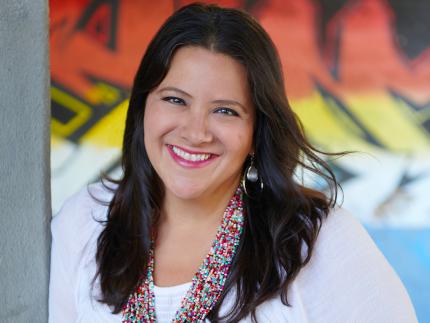Biblical Faith Includes Biblical Justice

According to Sandra Maria Van Opstal, every small group should include a seven year old – we need people who are not afraid to ask questions and wonder why.
“At some point [as we age] we stop asking questions, but I’m drawn to that space,” Van Opstal said during a conversation on a recent Open to Wonderpodcast by Faith Formation Ministries. “I want to keep interrogating what I believe and why I believe it. I want to bring new questions to the Scriptures. I want to ask, ‘Who has taught me this, and why? Does this work anymore for us?’ It keeps my faith fresh.”
Van Opstal plans to explore this type of posture with CRCNA members as she speaks at Inspire 2022. She will challenge attendees to think about the future of the church and whether we can pivot to live out our faith in the world so that it continues to be lived out by those who will be the church in the future.
“Our churches were shaped for one kind of person – whether that is generational, ethnic, or racial – and now the world has changed, and we are disoriented,” she explained. “We are either going to pivot and ask questions like our children and teens, or we are going to hold on to a form of practicing faith that is so much more cultural than it is necessarily biblical.”
In fact, our cultural lens may be preventing us from seeing some key aspects of what it means to worship and serve God, she argues.
Van Opstal is a second-generation Chicago-born Latina pastor and is a prominent advocate for the intersection between faith and justice.
“My experience has been that because we [in the global West] have such an individualistic personal, private faith journey with God, it has disoriented us from what Scripture actually talks about, which is a communal, collective journey of faith that is incredibly public,” she said on the podcast.
Scripture was written in the Near and Middle East by people who were part of a collective and agrarian society, she noted. We miss a lot when we ignore that context, she said. Van Opstal pointed to Ephesians 2:10 as an example.
“We were created in Christ to do good works,” she said, emphasizing the first word. “That is plural. We, the people of God, were created to do good works. We were created to reflect Christ in the world. We were created to live a life of compassion, love, and justice.”
Van Opstal lives this out in her own life. She has worked in North American and global contexts and is currently the executive director of Chasing Justice, a movement that mobilizes Christians to live justly. She argues that justice – practiced individually but also corporately – is a key part of worship.
All of the prophets and Scriptures, in both the New and Old Testaments, “call us to the worship of God as a lifestyle,” she said.
“Therefore, the spiritual practices we have – whether that be prayer, or corporate worship, or quiet devotional time, service, compassion – all of those things are supposed to draw us to God and are supposed to be done in the power of Christ and the power of the Holy Spirit.”
This includes justice.
If worship is corporate, congregational, and includes hearing sermons, singing songs, and gathering together but it “doesn’t result in a lifestyle of compassion and love for the most marginalized . . . [it] is just not biblical,” she said.
Van Opstal will be speaking at Inspire 2022 on August 5. She will also be offering a workshop earlier that day. To learn more or to register, visit crcna.org/Inspire. You can also listen to her episode on Open to Wonder.


